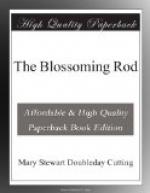In the delicious revelry of Baby’s joy, as her trembling, fat little fingers pulled forth dolls and their like, all else was forgotten until it was Mary’s turn, and then George’s, and then the mother’s. And then, when he had forgotten all about it: “Now father!” There was seemingly a breathless moment while all eyes turned to him.
“It’s father’s turn now; father’s going to have his presents. Father, sit down here on the sofa—it’s your turn now.”
There were only a blue cornucopia and an orange and a bottle of olives in his stocking, a Christmas card from his sister Ella, a necktie from grandmamma, and nothing, as his quick eye had noted, under it on the floor; but now George importantly stooped down, drew a narrow package from under the sofa and laid it beside his father, pulling off the paper. Inside was a slim, longish, gray linen bag. Langshaw studied it for a moment before opening it.
“Well, I’ll be jiggered!” he breathed, with a strange glance round at the waiting group and an odd, crooked smile. “I’ll be jiggered!”
There in its neatly grooved sections lay the rod, ready to be put together—not a rod, but, as his eye almost unbelievingly reassured him, the rod—the ticket of the shop adorning it—in all its beauty of golden shellac and delicate tip. His fingers touched the pieces reverently.
“Well, will you look at that! How did you ever think of getting it?”
“How did I think of it? Because you talked about it all the time,” said his wife scornfully, with her arms round his neck from behind, while the children flung themselves upon him. “Oh, I know you thought you didn’t; but you did just the same. George heard you, too. We got Mr. Wickersham to pick it out. He said it was the one you wanted. And the reel—you haven’t noticed that box there—the reel is the right kind, he says; and the line is silk—the best. There’s the book of flies too—six. Baby’s crazy over them! Mr. Wickersham said it was all just what you ought to have. We’ve been saving up for the longest time; but we had to wait, you see, for George’s deportment before the things could be bought. If it isn’t right—”
“Right? Say, this is the finest present I ever had!” said Langshaw with glittering eyes and that little crooked smile. “It just beats everything!”
He rose, scattering his adoring family, and, walking to the window, threw it open to the frosty December air and called across to a neighbour standing on the walk.
“Want to come over here, Hendon? Got something to show you. Will you look at this! Present from my wife and the kids—been saving up for it. It’s a peach, I’ll tell you that! I’m going to take George off fishing this spring—What? Well, come over later, when you’ve got time to take a good look at it.”
“Do you like it, father?” came from three different voices at once.
“Do I like it? You can just bet I do,” said Langshaw emphatically. He bent and kissed the three upturned faces, and leaned toward his wife afterward to press her sweet waiting lips with his; but his eyes, as if drawn by a magnet, were only on the rod—not the mere bundle of sticks he might have bought, but transformed into one blossoming with love.




